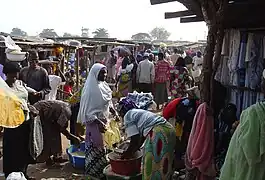Africa Rising
Africa Rising is a term coined in 2011 to explain rapid economic growth across Sub-Saharan Africa to date since 2000 and the inevitability of its subsequent continuation. The Financial Times defines Africa Rising as a "narrative that improved governance means the continent is almost predestined to enjoy a long period of mid-to-high single-digit economic growth, rising incomes and an emerging middle class."[1] The term was first coined by The Economist in December 2011.[2][3]

"Africa Rising" has been particularly associated with the democratisation of African states since the end of the Cold War, comparative peace, greater availability of mobile phones and the Internet, and increase in African consumer spending as well as a growth in entrepreneurship.[4] In the decade between 2005 and 2015, the economy of Africa as a whole increased by 50 per cent in contrast with a world average of 23 per cent.[5]
The term gained widespread use in the mid-2010s. It was the title of a 2014 conference held in Mozambique by the International Monetary Fund.[6] It was used by the BBC[7] and both The Economist and Time devoted front-pages to the narrative.[8] The term has also spawned a number of spin-off ideas, such as "Latin America Rising"[9] and "Asia Rising".[10]
"Africa Rising" has been criticised by some as being a "stereotype" of Africa as a continent "brimming with mobile phones and energetic businesses".[8] Critics have also argued that the narrative has been undermined by experience of the West African Ebola virus epidemic (2013–16)[11] and the persistence of conflict in parts of the continent.[5] Critics have also claimed that the 18 million Africans considered "middle class" are too small a proportion (3.3 percent) of the overall population to justify claims of rapid social change brought about by Africa Rising.[5]
Patrick Bond has argued that "Africa Rising" was coined at "the very moment that Africa's GDP ceased its rapid 2002–11 increase" following a sustained period of surging commodity prices and that their subsequent collapse "did not set the stage for renewed competitiveness, business confidence, or [transnational corporations'] investment, but instead catalyzed another round of fiscal crises, extreme current account deficits, sovereign debt defaults and intense social protests." He described "Africa Rising" as a neoliberal "chimera".[12]
See also
- Economic history of Africa
- BRICS (2010) and MINT (2014)
- Afro-pessimism (Africa)
- African Renaissance (1946–)
References
- Johnson, Steve (27 October 2015). "Slowdown calls 'Africa rising' narrative into question". The Financial Times. Retrieved 20 February 2016.
- "Africa can be a 21st-century powerhouse". ACCA Global. July 2017. Retrieved 21 July 2023.
- Maritz, Jaco (24 November 2012). "'Africa rising': TIME magazine agrees with The Economist". How we made it in Africa. Retrieved 21 July 2023.
- Wadongo, Evans (7 November 2014). "Africa rising? Let's be Afro-realistic". The Guardian. Retrieved 20 February 2016.
- Fabricius, Peter (11 November 2015). "Africa Rising or Africa Uprising?". Mail & Guardian. Retrieved 20 February 2016.
- "Africa Rising: Building to the Future". Africa-rising.org. International Monetary Fund. Retrieved 20 February 2016.
- Akwagyiram, Alexis (18 June 2013). "Africa rising - but who benefits?". BBC. Retrieved 20 February 2016.
- Franks, Suzanne. "Stereotyping Africa: from impoverishment to 'Africa Rising'". city.ac.uk. City, University of London. Retrieved 20 February 2016.
- "Latin America Rising". Yes! Magazine. Archived from the original on 21 December 2016. Retrieved 20 February 2016.
- "Report: Asia Rising". The Economist. Archived from the original on 3 March 2016. Retrieved 20 February 2016.
- Machirori, Fungai (26 August 2014). "How Ebola is challenging the 'Africa rising' narrative". The Guardian. Retrieved 20 February 2016.
- Bond, Patrick (17 October 2018). "'Africa Rising' in Retreat". Africa is a Country. Retrieved 21 July 2023.
Further reading
- Mahajan, Vijay (2009). Africa rising: How 900 million African consumers offer more than you think (4th ed.). Upper Saddle River: Wharton School Pub. ISBN 978-0132339421.
- Taylor, Ian (2014). Africa Rising? BRICS - Diversifying Dependency. Oxford: James Currey. ISBN 9781847010964.